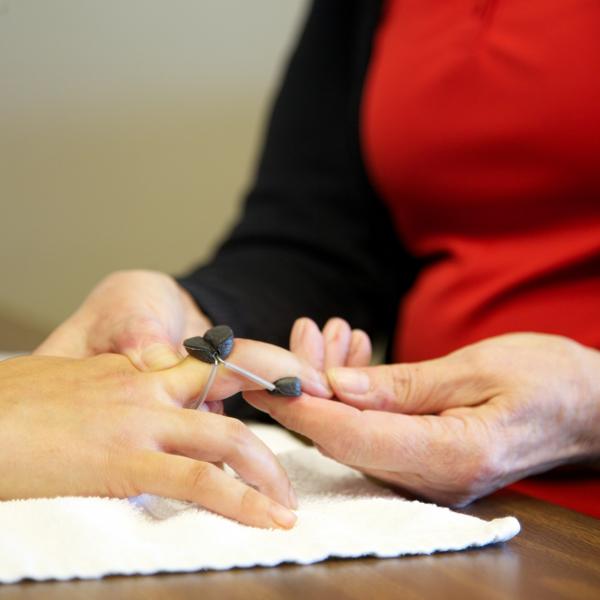
Contributions by: MaryLynn Jacobs, MA, OTR/L, CHT
During the first full week of June, ATI Physical Therapy, the American Society of Hand Therapists (ASHT) and members of the hand therapy community celebrate Hand Therapy Week and the benefits of hand therapy in an effort to raise awareness and educate the public.
With experts deployed across 17 states, ATI’s Certified Hand Therapists (CHT) are Occupational Therapists (OT) or Physical Therapists (PT) who, through advanced study and experience, specialize in treating individuals with conditions affecting the hands and upper extremity.
Why see a hand therapist?
A qualified hand therapist can evaluate and treat any problem related to the upper extremity. Hand therapists can effectively treat and rehabilitate the patient through post-operative rehabilitation, preventative, non-operative or conservative treatment or industry consultation. Therapists works closely with the physician and patient to provide a continuum of care. This often starts within days of the injury or surgery right through the patient’s return to work and/or a productive lifestyle. A hand specialist may also have advanced certification as a certified hand therapist.
What’s the difference between hand therapists and occupational/physical therapists?
Occupational therapists have graduated from an accredited OT program, passed a national registration exam and are licensed to practice as OTs in the state in which they work (unless no licensure exists in that state). Physical therapists that have graduated from an accredited PT program, passed a national registration exam and are licensed to practice in the state in which they work. Both OTs and PTs can practice in any specialty area of their professions, such as general rehabilitation, neurological rehabilitation, head injury, orthopedics, pediatrics, geriatrics or hand therapy.
A CHT is an OT or PT by profession with at least three years of experience, plus 4,000 hours of hand therapy practice (upper extremity rehabilitation). A CHT must have passed a certification examination that demonstrates knowledge of all areas of hand therapy before being granted the right to use the CHT designation. Hand therapists must renew their credential every five years through continued education and participation in hand therapy to continue using the CHT designation.
Hand therapy specialists provide:
- Accurate assessments, immediate care and effective treatment to reduce treatment time
- A continuum of care eliminating the need for multiple medical providers
- Faster recovery results in decreased medical costs
- Functional outcomes ensuring a faster return to work and productive lifestyle
- The most comprehensive care for their patients
Injuries and conditions treated by hand therapists
Through preventative, non-operative, conservative treatment, post-operative rehab and industry consultation, ATI hand therapists can effectively evaluate and treat complex upper extremity cases including:
- Soft tissue sprains and strains
- Fractures of the upper extremity
- Arthritic/degenerative joint disease
- Rotator cuff injuries and other shoulder pathologies
- Compression-based and traumatic peripheral nerve injuries
- Multiple trauma injuries
- Wound care
- Scar management
- Tendon lacerations and repairs
- Amputations and re-plantations
- Overuse tendinopathiesz
Are you experiencing pain in your hand, wrist or arm?
Stop by your nearest ATI Physical Therapy clinic for a complimentary screening and get back to doing you. Our certified hand therapists will guide your recovery through expert hand therapy services and can assure the best outcome for patients in need of this specialized care.
